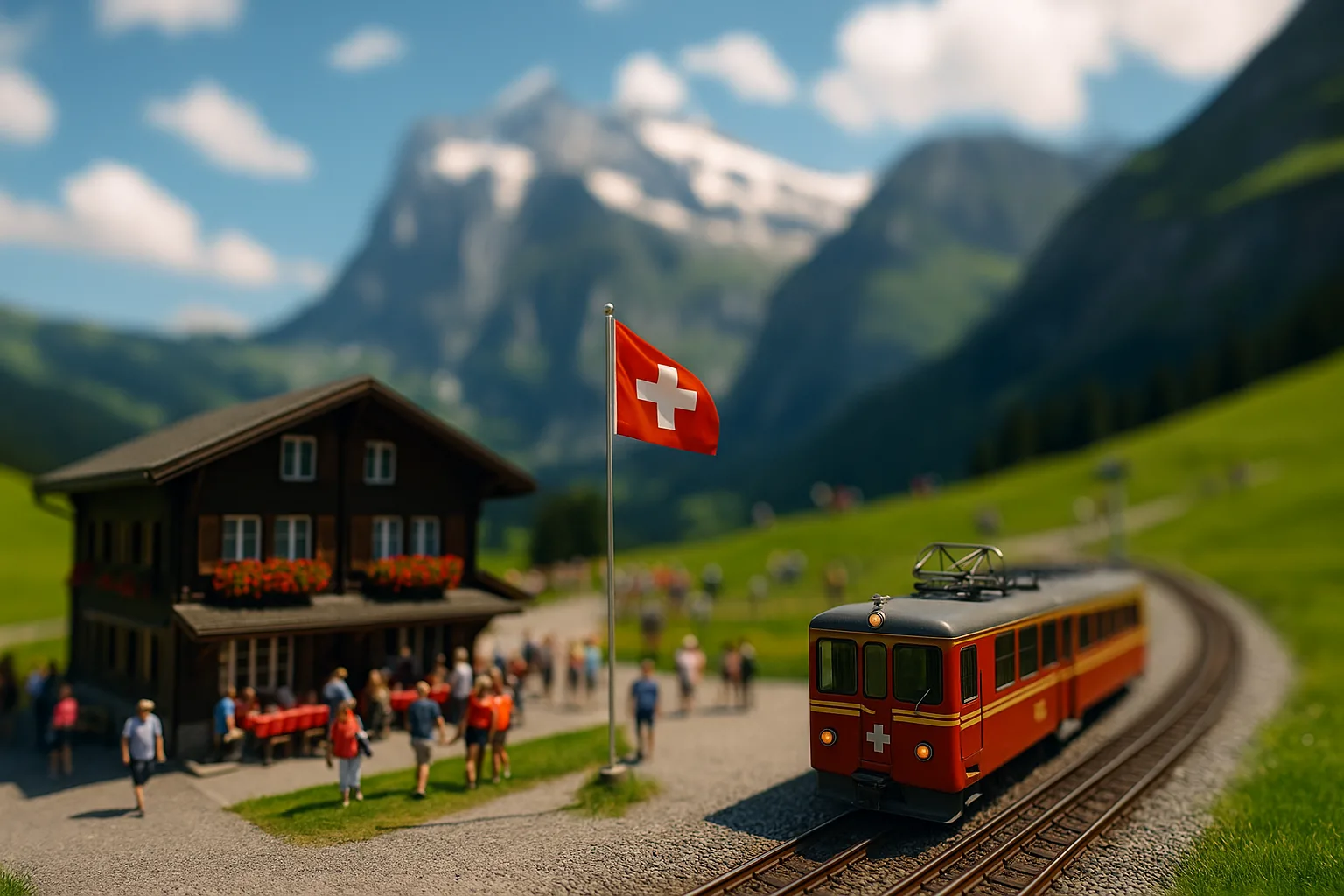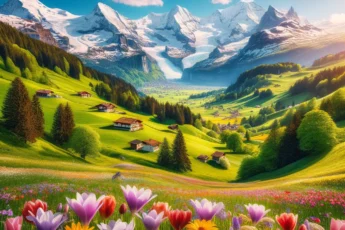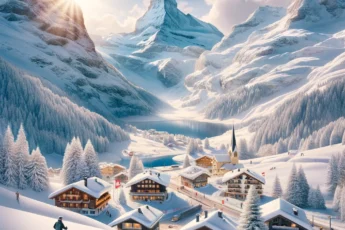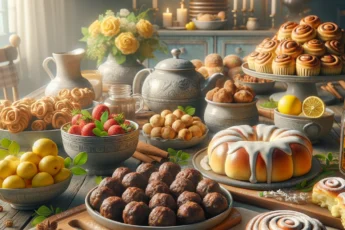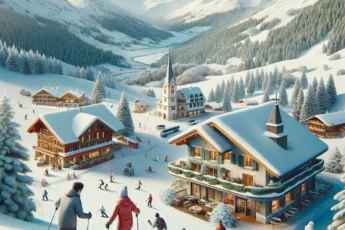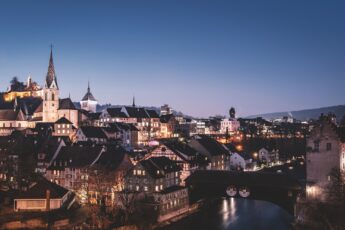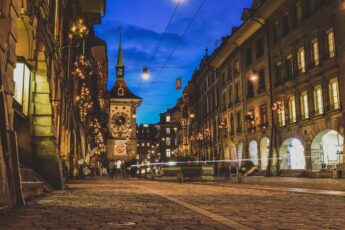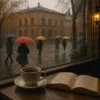Holidays in Switzerland in 2025 are an offer for demanding people - this country combines organizational precision, Alpine landscapes and high -class tourist infrastructure. From mountain trails in the Jungfrau region, through lakes ideal for bathing, to modern cities with world -class culture - everything works here on time and predictably. Prices are high, but the quality of services and security compensate for expenses. Switzerland is not a place for random tourists - this is a direction for those who plan with their heads and expect specific values: proven routes, comfort and purity. In this guide, we collected only verified information useful when planning a summer trip in 2025 - without banalities, without empty words, only real data, addresses, dates and costs.
Holidays in Switzerland 2025 - what is worth knowing before leaving?
Before you plan your vacation in Switzerland in 2025, learn the basic information that will help you organize a journey well - from weather, through prices, to documents and entry rules. Below you will find hard data: specific months, specific costs and zero generalities.
When is it best to go to Switzerland in the summer?
The optimal date for holidays in Switzerland is the period from June 15 to September 10. At this time, all mountain queues, high -mountain trails and bathing areas on the lakes are open. The most stable weather occurs in July and August - the average temperature in Zurich is 24 ° C, in the Interlaken region 21 ° C, and in the mountains (zermatt, height about 1600 m above sea level) - approx. 17 ° C during the day. The least rainfall is recorded in July in the Valais canton - on average 4 rainy days a month.
What are the prices of holidays in Switzerland in 2025?
Average prices in the summer season 2025 are as follows: accommodation at Hotel 3 ★ in the center of Zurich - from 720 CHF for 3 nights (June), in Interlaken - from 600 CHF. Holiday apartment rental (2 people) - from 130 CHF per night. Glacier Express (zermatt -St. Moritz) ride 2. Class - 158 CHF + 49 CHF must. Swiss Travel Pass (3 days) - 232 CHF (adult). Lunch at the middle class restaurant - 25-40 CHF. A bottle of water 1.5 LW Market - 1.20 CHF.
| Month | Wed. Temperature (Zurich) | Wed. Hotel price 3 ★/night | Days with rainfall (average) |
|---|---|---|---|
| June | 21 ° C | 220 CHF | 10 |
| July | 24 ° C | 260 CHF | 9 |
| August | 24 ° C | 270 CHF | 11 |
| September | 19 ° C | 200 CHF | 8 |
Swiss Alps in the summer - a paradise for mountain lovers
The Swiss Alps is the heart of summer holidays in Switzerland - over 65,000 km of marked trails, cable cars available up to 3800 m above sea level and an extensive network of high -mountain shelters. In the summer season 2025 all the main regions operate: Zermatt, Jungfrau, Davos, Saas-Fee, Verbier, St. Moritz. These are not walks for selfie amateurs - these are areas with a real output, variable weather and demanding routes. But the prize is panoramas of 4000-meter peaks, waterfalls and routes with an exhibition worthy of dolomites.
The most beautiful trekking routes in the Swiss Alps
Among hundreds of routes, it is worth distinguishing those that combine availability (mountain queues) with alpine views of the premium class:
- 5-seaenweg (zermatt): length 9.3 km, crossing time 2.5-3 hours, easy. Views on Matterhorn reflecting in five mountain lakes.
- Panoramaw (grindelwald - first): 6 km, 2 h, easy/medium. In the background: Eiger, Mönch and Jungfrau.
- Gornergrat Trail: 6 km, descent from Gornergrat (3089 m) to Riffelalp - 2 h, average. A permanent view of the Gorner and Matterhorn glacier.
- Gemmi Pass (Leuekerbad - Kandersteg): 9.5 km, 3–3.5 h, average/difficult. A fragment of the old trade route through the Alps.
- Hardergrarat Trail: 24 km, 10-12 h, very difficult. Technical ridge with an exhibition above Lake Brienz. Only for the experienced.
Summer attractions in the Jungfrau and Zermatt region
Jungfraubahn queue in the Jungfrau from June to mid -October - the most visited high mountain route in Europe. The train commutes to Jungfraujoch (3454 m) , where the Top of Europe station is located. Price: 210 CHF in both directions (from Lauterbrunnen, 2025). Travel time: 2 HW One page.
The Matterhorn Glacier Ride queue operates in Zermatt - the highest 3S cable railway railway railway, ending the route to Klein Matterhorn (3883 m). View: Italian, French and Swiss Alps. Ticket price from Zermatt: from 120 CHF (up and bottom).
In addition, there are mountain bicycle routes (MTB) , Tyrols (First Flyer, First Glider), rope parks and viewpoints available in queues without the need for climbing.
| Region | The most important attraction | Height | Price (2025) |
|---|---|---|---|
| Jungfrau | Jungfraujoch - Top of Europe | 3454 m | 210 CHF |
| Zermatt | Klein Matterhorn - Glacier Paradise | 3883 m | 120 CHF |
Zurich and Lucerna - holiday City Break in the heart of the country
If you plan to explore Switzerland in 2025 and want to combine the city's convenience with access to nature - Zurich and Lucerne are the two best choices. They are divided by only 52 minutes by train (SBB Intercity), and both offer direct connections with the main airports and mountain regions. Zurich is the largest city of Switzerland (over 440,000 inhabitants), a financial and cultural center, with perfectly organized communication and the highest standard of living in Europe. Lucerna, much smaller (approx. 82,000 inhabitants), offers medieval old town, views of the Alps and access to the Lake of Four Cantons.
TOP 5 attractions of Zurich in the summer
- Uetliberg (871 m above sea level): viewpoint with a panorama of the Alps and Zurich. Access by rail S10 - 27 minutes from the center, ticket: 8.80 CHF (2025, 2nd class).
- Switzerland National Museum (Landesmuseum): history of the country, from prehistoric times to the 20th century. Admission: 10 CHF, open every day except Mondays.
- Limmat River and City Halls: Seebad Engge, Frauenbad Stadthausquai - paid bathing zones with a view of the center. Admission: 8 CHF/day.
- Bahnhofstrasse: one of the most expensive shopping streets in Europe, but also a walking promenade between the station and the lake.
- The Museum of Art (Kunsthaus Zürich): works of Giametti, Munch, Hodler, Picasso. Admission: 23 CHF, on Wednesdays from 17:00 free admission.
What to see in Lucerne in one day?
- Kapellbrücke: the oldest wooden bridge in Europe (1333), length 204 m, with paintings from the 17th century. The bridge is open 24/7, free of charge.
- The Transport Museum (Verkehrshaus): the largest technical museum in the country - planes, railways, interactive exhibitions. Admission: 32 CHF (2025), open daily.
- Rosengart Museum: 220 works of Picasso, Klee, Cézanne. Ticket: 20 CHF.
- Rundfahrt on Lake Four Cantons: 1-hour panoramic cruise-price: 25 CHF (2025), from April to October.
- Museum of the City Wall (Museggmauer): 9 medieval towers, 4 open to visitors. Free admission, available from April to November.
Geneva and Lausanne - culture and relaxation at Lake Geneva
The region of Lake Geneva connects Alpine landscapes with Romanesque culture - Geneva and Lausanne are cities with strong French influence, with well -developed tourist infrastructure and a rich cultural offer. Both are located on the lake, with direct access to bathing areas, promenades and cruises. Thanks to well -working communication (trains every 30 minutes, travel time: 36 min, price: 12 CHF), you can visit them together on one intense weekend.
What to see in Geneva in the summer?
- Jet D'Eau: Fountain on Lake Geneva throwing water to a height of 140 m - visible from each point of the promenade. The best view from Parc des Eaux-Vives.
- Musée d'Art et d'wistoire: the largest Museum of Geneva, over 650 thousand exhibits - from Egyptian mummy to the works of Van Gogh. Free admission from Geneva Pass, normally: 15 CHF.
- Old Town and cathedral of St. Piotr: A medieval center with cobbled streets and the possibility of entering the tower (157 stairs) - view of the lake. Admission: 7 CHF.
- Parc des Bastions: 64,000 m² of greenery with a monument to the Reformation and garden chess. Open around the clock, free of charge.
- Lake cruises: 1-hour guided tour-17 CHF, every day from April to October.
The best attractions of a bed for tourists
- Olympic Museum: the only such museum in the world - interactive exhibitions about the history of the Games and a modern Olympic garden. Admission: 20 CHF, children up to 15 years: 10 CHF.
- Cathedral in Lausanne: a Gothic building from the 13th century, one of the most valuable monuments in the country. Entrance to the tower: 6 CHF. Open every day.
- Esplanade de Montbenon: observation deck with a panorama on the Alps and Lake - an ideal place for a picnic. Free access.
- Plateforme 10: New Art Center in the former railway complex-Cantonal des Beaux-Arts, Photo Elysée and Mudac museums. Admission: 15 CHF (all three).
- Ouchy Promenade: coastal walking zone with swimming pool access and gastronomic points. Possibility to rent bicycles or boats (from 15 CHF/h).
Interlaken - an active leisure center
Interlaken, located exactly between the lakes of Brienz and Thun, is not a random resort - it is the Swiss capital of extreme sports and the base for Jungfrau Region. The town has just over 5,000 residents, but in the summer season he serves tens of thousands of tourists a day. The infrastructure is fully prepared for active travelers: from railway stations and marina to parachute and rafting jumping offices. In the summer of 2025 there are over 40 certified adventure tourism operators, and all water and air routes are monitored for safety.
Extreme sports at Interlaken - what to choose?
- Skydiving jumps: from a height of 4000 m, with a view of Eiger, Mönch and Jungfrau. Time of free falling: approx. 45 seconds Price: from 430 CHF (2025), previous health examination.
- Paragliding (paragliding): tandem flights from Beatenberg (1350 m) to Interlaken - flight time: 15-20 minutes. Price: 180–200 CHF.
- Rafting on Lütschine: Wildwasser Class III -IV, rafting time: approx. 1.5 hours. Required swimming skills. Price: from 125 CHF/person
- Canyoning (Saxeten or Chli Schliere): jumps, rope conventions and slide down waterfalls - duration: 3-4 hours. Price: from 150 CHF.
- Bungee jumping from Stockhorn gondola: height: 134 m on Lake Hinterstockensee. Price: 210 CHF.
| Activity | Price (CHF) | Duration | Risk |
|---|---|---|---|
| Skydiving | 430 | 2.5 hours (total) | Tall |
| Parallel | 180 | 1 h (with preparation) | Mediocre |
| Lütschine rafting | 125 | 1.5 hours | Medium/high |
| Canyoning Saxten | 150 | 3-4 h | Tall |
| Bungee stockhorn | 210 | 1 h | Tall |
Cruises on the lakes Brienz and Thun
If you are not looking for adrenaline jumps, but you still want to explore the region, cruises around the lakes are an excellent option. Supported by BLS Schiffhrrt, ships run every day from April to mid -October.
- Lake Brienz: Interladen OST - Brienz route (approx. 1 h 10 min), panoramic cruise with a view of Giessbachfälle (waterfalls). Price: 36 CHF one way (2025).
- Lake Thun: Interlaken West - Thun route (1 h 50 min), Spiez, Oberhofen and Hünegg's castles along the way. Price: 40 CHF.
Gastronomy options are available on board, and Swiss Travel Pass covers 100% of the costs of both cruises.
Switzerland lakes - baths, sailing and rest
Switzerland has over 1,500 lakes, of which a dozen or so are ideal for rest in the summer season. The water in them is regularly examined in terms of purity - data from the Federal Environment Office (BAF) indicate that over 95% of public bathing areas meet strict quality standards. From June to September, the water surface temperature in the largest tanks reaches 20-24 ° C, and infrastructure (beaches, changing rooms, rescuers) matches the level of Mediterranean countries.
Where to bathe in Switzerland - lakes with clean water
- Lake Geneva (Lac Léman): The largest lake of the country, with numerous city bathing areas - including Plage de Vidy in Lausanne (free) and Bains des Pâquis in Geneva (admission: 2 CHF).
- Bodeńskie Lake (Bodensee): on the Swiss side: Romanshorn, Arbon, Kreuzlingen - bathing areas with shallow descent and sanitary monitoring. Temperature in July: 21–23 ° C.
- Lake of four cantons (Vierwaldstättersee): bathing areas in Luzer ( Lido Luzern , introduction: 8 CHF), Weggis and Vitznu - perfect in good weather.
- Lake Thun: Strandbad Thun beach - the largest bathing complex in the Bernese region, with a volleyball court, trampolines and SUP rental. Introduction: 6-8 CHF.
- Lake Brienz: More wild, with less infrastructure - the beach in Iseltwald with a view of the Giessbach waterfall, free.
Sailing and viewing cruises - what to choose?
In the summer season (May -October), regular passenger ships, served by BLS (Thun, Brienz), CGN (Geneva), SGV (Lucerna) and SBS (Bodensee) float on the largest lakes. Tickets can be bought at ticket offices, machines and online - Swiss Travel Pass includes all routes.
- Lucerna-cruise on the Lake of Four Cantons: 1-hour route to Kehrsiten-Bürgenstock: 25 CHF. View of the Pilatus and Rigi massif. The catamarans run every 30 minutes.
- Geneva - panoramic cruise: route 1 h around the port and fountain Jet d'Eau. Price: 17 CHF. Audio comment in several languages.
- Bodensee - Romanshorn -Friedrichshafen (Germany) course: 45 min, price: 13 CHF. Possibility to take a bike.
- Brienz - cruise to Giessbach: 35 min, price: 18 CHF. Stop at the nineteenth-century hotel with a view of the waterfalls.
| Lake | Swimming pool / cruise | Price (CHF) | Availability |
|---|---|---|---|
| General | Bains des pâquis / cruise 1h | 2 / 17 | May -October |
| Bodenian | Kreuzlingen / romanshorn -friedrichshafen | free / 13 | June -September |
| Four cantons | Lido Luzern / Rejs 1h | 8 / 25 | every day |
| Thun | Strandbad Thun / Rejs 2h | 8 / 28 | July -September |
| Brienz | Iseltwald / cruise to Giessbach | free / 18 | every day |
Bernina Express and Glacier Express - Lightning journey by rail
Switzerland offers the two most spectacular railway routes in Europe: Bernina Express and Glacier Express . Both lead through the highest laid railway passes of the continent, using viaducts, spiral tunnels and gear rail technique. In 2025, trains run every day - it is necessary to book space in advance (online or at the ticket office). Travel is not only a means of transport - it is a full -fledged tourist attraction.
Bernina Express route - where to stop?
Bernina Express connects Chur with Tirano (Italy) through the Bernina Pass (2253 m above sea level) - this is the highest railway route without electric traction in Europe. Length: 144 km. Travel time: 4 h 13 min. Price: from 63 CHF (2nd class, without a seat). Mandatory spot: 20–26 CHF (seasonally). Supported by Rhätische Bahn (RHB) .
The most important points of the route:
- Chur: The oldest city of Switzerland, starting point. Good access from Zurich (1 h 25 min).
- Landwasser Viadukt: Symbol of the Swiss railway - 65 m high, 6 spans, inscribed on the UNESCO list.
- ALP Grüm: observation stop without road access. You can get off and come back by another train.
- Ospizio Bernina: The highest point of the route - stop on an open plateau with a view of Lago Bianco and glaciers.
- Tirano: End station in Italy - possible connections to Milan (2 h 30 min).
Glacier Express - from St. Moritz to Zermatt
Glacier Express is "the slowest express train of the world" - he overcomes the St. Moritz - Zermatt (290 HP) in 7 h 45 min. The passage includes 291 bridges and 91 tunnels. Supported by RHB and Matterhorn Gotthard Bahn . Ticket price (2nd class, 2025): from 152 CHF. Compulsory spot: 39 CHF (in June -October).
Key route points:
- St. Moritz: Luxury resort and starting point of the route. Possibility to buy Glacier Express with a meal served to the place.
- Oberalp Pass: The highest point of the route - 2033 m above sea level, here the train goes with the help of the gear.
- Andermatt: A transfer point to the Uri region and the Reuss Valley.
- BRIG: A historic city with baroque architecture - often chosen as a starting point in the Berne Alps.
- Zermatt: end station at the foot of Matterhorn. Here you can continue traveling by Gornergratbahn (from 90 CHF up).
| Route | Distance | Time | Price (2nd grade) | Seat |
|---|---|---|---|---|
| Bernina Express | 144 km | 4 h 13 min | 63 CHF | 20–26 CHF |
| Glacier Express | 290 km | 7 h 45 min | 152 CHF | 39 CHF |
Switzerland castles and fortresses - history against the background of the mountains
Switzerland is not associated with castles, but it has over 500 fortified objects - from well -preserved fortresses to ruins with a view of the Alpine Valley. Most of them come from the 11th -18th centuries, although many were rebuilt in the 16th and 17th centuries. In the summer season 2025 some of the facilities are available for sightseeing every day, others only on weekends or with a guide. Entrances are paid, but prices are moderate for Switzerland - most tickets do not exceed 15 CHF.
Chillon Castle on Lake Geneva
Chillon is the best preserved medieval castle in the country and the most visited historical monument in Switzerland. Located on a rocky island 3 km from Montreux, with a view of the Alps and Lake Geneva, he was the residence of the princes of Sabaudia and the Border Fortress.
- Address: Avenue de Chillon 21, 1820 Veytaux
- Opening hours (2025): daily 9: 00-18: 00 (May -September)
- Ticket price: 13.50 CHF (adults), 7 CHF (children 6-15 years old), free audio guide
- Sightseeing time: approx. 1.5-2 hours
- Access: Train to Montreux + Bus 201 to the "Chillon" stop (every 10 minutes)
TOP 5 castles to visit in the summer
- Gruyères Castle (Furburg canton): the 13th-century residence of Gruyères Counts. Admission: 12 CHF. Open daily 9: 00–18: 00 (May -October). View of the Prealpy and the Saane Valley.
- Tarasp (rodent canton): Renaissance cliff lock over the Engadine Valley. Visiting only with a guide. Tickets: 18 CHF, hours depending on the season. Private facility, in the possession of the artist NOT VITAL.
- Hallwyl Castle (Argo canton): Water fortress on the island on the Aabach River. Regional Museum. Open from March 28 to October 27, 2025, every day except Monday. Price: 12 CHF.
- SPIEZ Castle (on Lake Thun): a medieval stronghold with a baroque chapel and gardens. Open daily 10: 00–17: 00. Price: 10 CHF.
- Valère Castle (Sion, Canton Valais): Castle and Kościełyny complex from the 12th century Museum, organs from 1435 (the oldest operating in Europe). Free entrance, with seasonal restrictions.
| Lock | Location | Opening hours | Price (adults) |
|---|---|---|---|
| Chillon | Veytaux (Montreux) | 9:00–18:00 | 13.50 CHF |
| Gruzyères | Fryburg canton | 9:00–18:00 | 12 CHF |
| Tarasp | Rodent | with a guide | 18 CHF |
| Hallwyl | Arms | Tue - ND., 10: 00–17: 00 | 12 CHF |
| Spit | At Lake Thun | 10:00–17:00 | 10 CHF |
Switzerland kitchen - what is worth eating in the summer?
Switzerland's cuisine is a precise mix of German, French and Italian influences, rooted in local products: cheese, potatoes, wine and venison. In the summer, lighter dishes dominate, but still full -bodied - perfect on a mountain journey. Cheese ripens in the Alpine valleys, and chocolate is still produced in small manufactories, not only in the industrial plants Nestlé or Lindt. In 2025, there are still over 160 active cheesecakes and about 40 original chocolate shops with access to tourists.
Fondue, Raclette and other regional specialties
- Fondue Mitié-Mitié (Fryburg canton): a mixture of Gruyère and Vacherin Fribourgeois cheese, melted with white wine and garlic, served with bread. Price in the restaurant: 28–35 CHF/person
- Raclette (Canton Valais): dissolved cheese raclette du Valais Aop with boiled potatoes, grates and onions. Restaurant portion: 25-30 CHF.
- Älplermagronen (central cantons): pasta with potatoes, cream, onion and cheese, often with apple sauce. Price: 18–22 CHF.
- Zürcher Geschnetzeltes (Zurich): thinly cut veal in cream sauce with white wine, served with rösti. Restaurants in Zurich: 36–42 CHF.
- Capuns (rodent canton): Boćwine leaves with flour, meat and cheese leaves - a dish typical of the Engadine Valley. Served mainly in mountain tapestries.
Swiss chocolate - where to buy and which one to choose?
Switzerland produces over 200,000 a year. tons of chocolate, of which about 40% is export. There are over 40 well -known brands in the country, but smaller manufactories offer the most unique products.
- Läders (present in 30 cities): handmade plaques and patches with additives - pistachios, freeze fruit, salt. Shops, among others in Lucerne, Zurich, Bernie.
- Maestrani (Flavil, Canton St. Gallen): Factory from the Center for Tourists. Admission: 14 CHF. Possibility of tasting and purchase of limited editions.
- Camille Bloch (Courtelary, Canton Bern): Creator of Ragus and Torino bars. Visiting with a guide: 15 CHF, reservation necessary.
- Lindt Home of Chocolate (Kilchberg, Zurich): a modern museum with the world's largest chocolate fountain (9 m). Admission: 15 CHF, price tasting.
| Product | Region | Price in a restaurant/store | Comments |
|---|---|---|---|
| Fondue | Fribus | 28–35 CHF | with wine and bread |
| Raclette | Valais | 25-30 CHF | with potatoes and cucumbers |
| Älplermagronen | Zentral | 18–22 CHF | with apple mousse |
| Zürcher Geschnetzeltes | Zurich | 36–42 CHF | from Rösti |
| Chocolate läders | all Switzerland | from 7 CHF/100 G | handmade |
Transport in Switzerland - how to move in 2025?
Switzerland has one of the best organized public transport systems in the world - punctuality average trains in 2023 amounted to 92.5%, and the network covers over 5,200 km of railway lines. In 2025, all tourist regions (including the Alps, lakes and cities) are served by regular rail, bus and ferry connections. The system works integration - timetables and tickets are available in one application (SBB Mobile), in many cases you do not need to reserve. For tourists, Swiss Travel Pass - the only ticket covering the whole country remains the optimal solution.
Swiss Travel Pass - what does it include and how much does it cost?
Swiss Travel Pass is a personal ticket valid throughout Switzerland, available in variants 3, 4, 6, 8 or 15 days. Entitles you to an unlimited number of journeys:
- all SBB and regional train trains (including panoramic, e.g. Glacier Express - except for a seat),
- regional buses and public transport (including Zurich, Geneva, Bernie, Lucerne),
- passenger ships (lakes: Geneva, four cantons, Thun, Brienz, Bodeńskie),
- over 500 museums (free admission or discount),
- Discounts on rope queues (usually 25-50%).
Prices Swiss Travel Pass (2025, 2. Class):
- 3 days - 232 CHF
- 4 days - 281 CHF
- 6 days - 359 CHF
- 8 days - 389 CHF
- 15 days - 429 CHF
The ticket is only available online or in application, activated from the smartphone. It does not require physical print. Children up to 16 years of age travel for free with the Swiss Family Card (issued at the purchase of STP).
Alternatives to the car: trains, buses, ferries
In addition to Swiss Travel Pass, there are also local tickets and special offers. In practice, traveling by car around Switzerland is rare - parking lots are paid (5-8 CHF/HW cities), and the public transport network even reaches places inaccessible to road traffic (e.g. Mürren, Wengen).
- Regional trains: dense network, average zurich -lurate travel time: 52 min, price: 13.60 CHF. Does not require reservation.
- Postbus: The largest bus network in the country, reaches the Alpine valleys, passes and shelters. Example: Andermatt -LukManierpass route - 2 h, 16 CHF.
- Ships: They run regularly on the main lakes. BLS (Brienz, Thun), CGN (Geneva), SGV (Lucerna), SBS (Bodeńskie). Most of the routes covered by STP.
| Means of transport | Range | Sample cost | Comments |
|---|---|---|---|
| Swiss Travel Pass | whole country | 232–429 CHF | Unlimited access + museums |
| SBB trains | Cities, Alps | 13–80 CHF | without reservation, punctuality 92%+ |
| Postbus | mountainous areas | 10-20 CHF | Often the only option in the valleys |
| Rays | lakes | 17–40 CHF | scenic routes covered by STP |
Accommodation in Switzerland - from luxury to shelters
There are over 4,700 certified accommodation facilities in Switzerland - from hotels 5 ★ to mountain shelters without access to the road. In 2025, the summer season begins in most regions on June 1 and lasts until mid -October. The high season falls in July and August - during this period prices are growing 20-40% compared to June and September. It is worth booking in advance, especially in the regions of Zermatt, Lauterbrunnen, Grindelwald and on the lakes of Geneva and four cantons. Below is a statement of real possibilities in various budgets.
The best hotels and apartments in mountain resorts
- Grand Hotel Zermatterhof (Zermatt): a five -star object with a view of the Matterhorn, SPA, swimming pool and 3 restaurants. Price in July 2025: from 680 CHF/night (double room).
- Romantik Hotel Schweizerhof (Grindelwald): 4 ★ Hotel with direct access to the railway station and the panoramic terrace. Price: from 420 CHF/night.
- Whitepod Eco-Luxury Hotel (Monthey, Valais): Residential domes with private terraces in the off-grid system. View of the Alps, your own restaurant. Prices from 390 CHF/night.
- Mountain Hostel (Gimmelwald): shelter with multiplayer and private rooms, access only by cable car. Accommodation from 40 CHF/person, ideal for wanderers.
- Airbnb - Lauterbrunnen: Apartment with kitchen, balcony and a view of Staubbachfall. Average price: 160–200 CHF/night (2 people).
Budget campsites and accommodation - how to save?
Switzerland has a well -developed camping network - over 350 certified places with access to sanitary, laundry and shared kitchens. Camping is most often located by lakes or on the outskirts of cities and alpine towns. the Swiss Youth Hostels youth hostels operate (over 50 locations).
- Camping Jungfrau (Lauterbrunnen): with a view of waterfalls, Parcels for tents, motorhomes and mobile houses. Prices: from 18 CHF/person + 10 CHF Parcela (tent).
- Camping Aaregg (Brienz): on the very bank of the lake, with access to the swimming pool. Prices: 21 CHF/person + fee for a place (from 15 CHF).
- Youth Hostel Interlaken: Modern 2- and 4-bed rooms, breakfast in the price. From 55 CHF/person. Reservation possible online up to 6 months in advance.
- Berggasthaus Aescher (appeenzell): shelter carved out in rock, one of the most iconic in Europe. Price of accommodation: from 75 CHF with breakfast. No access - only on foot or cable car + 20 min march.
| Type of object | Location | Price (2025) | Availability |
|---|---|---|---|
| Hotel 5 ★ | Zermatt | 680 CHF | the whole season |
| Hotel 4 ★ | Grindelwald | 420 CHF | June -October |
| Airbnb | Lauterbrunnen | 160–200 CHF | July-August-high availability only when booking min. 2 months earlier |
| Camping | Brienz | 36 CHF/person | from May to September |
| Shelter | Interladen | 55 CHF/person | all year round |
Family vacation in Switzerland - attractions for children
Switzerland is one of the safest places for family vacation in Europe - low risk of crime, clean air, great infrastructure and logically planned attractions make traveling with children a real pleasure here. In 2025, there are over 60 certified family -friendly facilities, and most tourist regions offer dedicated discounts for children and special family packages - especially with local cards (e.g. Ticino Ticket, Berner Oberland Pass).
Amusement parks and adventures: Swiss Vapeur, Conny-Land and others
- Swiss Vapeur Park (Le Bouveret, Canton Valais): miniature steam trains on routes on a 1: 4 scale - children and adults can get into the wagons and travel around the park. Open: from March to November, tickets: 19 CHF (children 3-15 years old), 23 CHF (adults).
- Conny-Land (Lipperswil, Canton Thurgau): the largest amusement park in the country-dolphinarium, water queues, carousels and VR zone. Open daily from April to October. Tickets: 39 CHF (children 4–15), 45 CHF (adults).
- Zurich Zoo + Masoala Regenwald: Zoological garden with a tropical hall and trail in the treetops. Children: 15 CHF, adults: 29 CHF. Open all year.
- Technorama (Winterthur): One of the best science centers in Europe - hundreds of interactive physics, chemistry, biology and robotics positions. Tickets: 19 CHF (children), 32 CHF (adults). Perfect from the age of 7.
- Papiliorama (Kerzers, Fryburg canton): tropical dome with butterflies, night zoo, playgrounds. Prices: 13 CHF (children), 19 CHF (adults).
Educational and natural games in the mountains
- Muggestutz Erlebnisweg (Meiringen -Hasliberg): Fairytale Path about Karle Muggestutzu - wooden houses, play installations, and history boards. Length: 3.5 km, available for off -road prams. Open from June to October. Free (fee only for a cable car: 16 CHF/child, 32 CHF/adult in 2 pages).
- Globi WanderWeg (Engelberg): Interactive path for children 4-12 years with the figure of the popular Swiss hero. Stations with puzzles and field games. Length: 2.5 km. Free entrance, queue to the starting point: 34 CHF/adult (discounts with guest card).
- Sentier des Marmottes (Zinal, Valais): Route with marmots observation points, telescopes and animal models. Route: 2 km, access by train (12 CHF/person). Available from mid -June.
- SATTEL HOCHSTUCKLI-rope bridge + summer toboggan run: 374-meter hanging bridge for children 5+, downhill track (950 m) with a brake. Daily ticket: 35 CHF (children), 42 CHF (adults).
- LAMA-Trekking (Brienzergrrat, Canton Bern): Hiking trips with lamas-1.5-3 hours, children can lead animals themselves. Prices from 30 CHF/person Reservation required.
| Attraction | Age group | Price (2025) | Availability |
|---|---|---|---|
| Swiss Vapeur Park | 3-15 years | 19 CHF | March -Listopad |
| Conny-Land | 4–14 years old | 39 CHF | April -October |
| Muggestutz Weg | 4-10 years | 0 CHF (+ queue) | June -October |
| Technorama | 7–16 years old | 19 CHF | all year round |
| Sattel Hochstuckli | 5+ years | 35 CHF | May -October |
Ecotourism and Slow Travel in Switzerland - modern trends
In 2025, Switzerland remains one of the leaders of sustainable tourism in Europe. As many as 89% of domestic tourists and 64% of foreign declares interest in environmentally friendly travel forms (source: Schweiz Tourismus, 2024). The country offers over 800 certified Eco-Friendly facilities, hundreds of kilometers of routes without access to cars and local initiatives supporting agriculture, handicrafts and regional cuisine. Slow travel and ecotourism are not fashionable slogans here, but a specific infrastructure and real choices that can be taken while traveling.
Ecological accommodation and local products
- Whitepod Eco-Luxury Hotel (Monthey, Valais): Ecological residential domes in the off-grid system, with local products and power supply from solar panels. Price: from 390 CHF/night, Green Globe certificate.
- Hotel Valsana (Arosa, Rodent): the first hotel in Switzerland with ice energy storage system, wood and recycled steel building, breakfast only from regional products. From 290 CHF/night.
- Agroturystyka Biohof Zahner (canton appenzell ausserrhoden): a farm with accommodation, cheese workshops and local cuisine. Price: from 95 CHF/person/night, including breakfast from products from your own farm.
- Ferien Im Baudenkmal: Foundation offering the rental of restored historical buildings - old mills, stables and country houses - with original materials. From 110 CHF/night.
- Local products: AOP cheese (Gruyère, Raclette, Sbrinz), mountain honeys from Valais and Uri cantons, wine from Lavaux and Ticino, sourdough breads from regional bakeries (e.g. Pain de Seigle Valaisan).
Slow Travel - how to visit less, but better?
Switzerland is an ideal country for the idea of Slow Travel - many places are visited by foot, bike or rail, without the need to move every day. Many regions promote a longer stay in one place instead of quick flights from city to city. Below are examples of initiatives and places supporting this way of travel:
- Bergsteigerdörfer (mountain villages): an international initiative covering 5 Swiss villages (including Grimentz, Guarda) - without mass infrastructure of tourism, but with certified routes and local guides.
- Via Alpina: Multi -day pedestrian trail through the Alps, with accommodation in local guesthouses. It is possible to cross short sections without having to finish the entire route.
- Reka-Ferien (family holidays without a car): a network of holiday resorts located on rail and pedestrian routes, promoting holidays without a car.
- Switzerland nature parks: 19 officially recognized protected areas with the Slow Tourism offer - including Jurapark Aargau, Parc Ela, Naturpark Pfyn-Finges regios. Possibility to participate in workshops, collections, local thematic walks.
| Initiative / object | Type | Region | Price / Availability |
|---|---|---|---|
| Whitepod | Hotel Eco-Luxury | Valais | 390 CHF/Night |
| Biohof zahner | agritourism | Appeenzell | 95 CHF/OS./Night |
| Via alpina | walking trail | whole country | free of charge (fee for accommodation) |
| Reka-Ferien | Holiday estate | 20+ location | from 650 CHF/week |
| Ferien im baudenkmal | Historical houses | various cantons | 110–200 CHF/Night |
Practical information - money, internet and security
A trip to Switzerland is associated with several significant differences in relation to EU countries - its own currency (CHF) applies here, there is no free roaming, and some services operate according to local regulations. In 2025, the country remains one of the safest places in Europe, but prices and utility costs may surprise unprepared. Below - the specifics that every tourist needs.
Swiss franc and card payments
- Currency: Switzerland only uses the Swiss franc (CHF) . Course in May 2025: 1 CHF = approx. 4.50 PLN / 1 CHF = 1.02 EUR (average courses).
- Card payments: Visa, MasterCard cards, and larger cities and tourist facilities are widely accepted - also Revolut, Apple Pay and Google Pay. Amex less often.
- Cash: still needed in mountain shelters, some campsites and at rural fair. ATMs available in every town with over 500 residents.
- Payments from the ATM: Bank dependent commission - e.g. Revolut free of charge to 200 CHF/month, then 2%. Local commissions usually 0-2 CHF.
Internet, roaming and access to Wi-Fi
- Roaming: Switzerland does not belong to the EU - the cost of connection with the Polish SIM card is usually PLN 5-10/min, SMS: PLN 1.50-2, 1 MB of data: up to PLN 30. Activate the appropriate package before leaving.
- Local SIM cards: The cheapest solution with a longer stay. Prepaid offers (e.g. Yallo , Salt , Sunrise ): 10-20 CHF for 3-10 GB of data. For purchase at the post office, in kiosks or at the airport.
- Public Wi-Fi: free in most hotels, at SBB stations, in museums and many cities (Zurich, Lucerna, Bern). Logging in via SMS or starting page. Quality - average to good (10-30 mbps).
- Internet in the mountains: LTE coverage from Swisscom and Sunrise up to 2500 m above sea level in shelters, availability depends on location - often no coverage inside buildings.
| Service | Price (2025) | Availability | Comments |
|---|---|---|---|
| Payment from an ATM | 0–2 CHF | universal | Revolut: Without a commission up to 200 CHF/month |
| Prepaid SIM (5 GB) | 15 CHF | airports, kiosks, online | Operators: Yallo, Sunrise, Salt |
| Public Wi-Fi | 0 CHF | stations, hotels, museums | often logging in via SMS |
| EU roaming | up to PLN 30 /1 MB | whole country | inaccessible EU roaming |
Events and festivals in Switzerland in the summer of 2025
The summer season in Switzerland is not only mountains and lakes - the country organizes dozens of festivals that attract both tourists and local residents. In 2025, over 150 confirmed events were planned - from classical music, through cinema, to folklore festivals and craft fairs. Many of them take place in the scenery of the Alps, often in the open air, with rail access or ship. It is worth following the dates and booking tickets in advance - some festivals are selling entirely in spring.
The most interesting music and film festivals
- Montreux Jazz Festival (5-20 July 2025, Montreux, Lake Geneva) - one of the most famous jazz festivals in the world. The 2025 edition takes place on several stages by the lake, including at Montreux Music & Convention Center. Tickets: from 85 CHF, part of the concerts free.
- Locarno Film Festival (6-16 August 2025, Locarno, Ticino) - International Film Festival with shows at Piazza Grande (8000 places). Tickets: 20-40 CHF for screenings, passes: from 120 CHF. One of the most important events of independent cinema in Europe.
- Gurtenfestival (17-20 July 2025, Bern) - an alternative, pop and electronics festival on Mount Gurten (access by cable car). Artists 2025: Florence + The Machine, Loyle Carner, Nina Chuba. Passes: from 210 CHF, one -day tickets: from 80 CHF.
- Paleo Festival Nyon (22-27 July 2025, NYON)-the largest Open-Air in Switzerland. 6 days, 7 scenes, over 200 concerts. Artists 2025: Stromae, Queens of the Stone Age, Aya Nakamura. Tickets from 420 CHF, one -day from 90 CHF.
- Verbier Festival (July 18 - August 4, 2025, Verbier) - a prestigious classical music festival with the participation of the Verbier Festival Orchestra orchestra and world -famous soloists. Tickets: 30–160 CHF.
Local events: fair, fiesta and regional holidays
- Fête de l'scalade (summer version) - a special edition of the Historical Festival of Geneva, organized in the form of a festival at Parc des Bastions (July 13, 2025). Historical costumes, reconstructions, fairs with local food. Free admission.
- Marché folklorique de vevey (every Saturday in July and August 2025) - a traditional folk market with wine, cheese and dance performances. Place: Grande Place in Vevey. Free admission.
- Fête Nationale Suisse - August 1, 2025 - Celebration of the Switzerland National Day in every town: marriage, fireworks, speeches. The largest events in Bern (BundStplatz), Lucerne and Zermatt. Free admission.
- Alpfahrt and Désalpe (August -September): traditional cattle descent from alpine halls. The largest parades take place in Charmey (September 7), Semsales and Gruyères. Events with music, fairs and tastings.
- Festichoc (Étoy, Canton Vaud): 22nd edition of the Chocolate Festival - although the main edition falls in the spring, in August 2025 "Festi'choc Été" is planned with tastings and workshops. Admission: 5 CHF, children for free.
| Event | Date | Location | Admission / tickets |
|---|---|---|---|
| Montreux Jazz Festival | July 5-20 2025 | Montreux | from 85 CHF |
| Locarno Film Festival | August 6-16 2025 | Locarno | 20-40 CHF |
| Fête nationale suisse | August 1, 2025 | whole country | free |
| Marché folkloreique de vevey | Saturday July -August | Vevey | free |
| Alpfahrt / Désalpe | August -September | Charmey, Gruyères | free |
Budget trip to Switzerland - how not to overpay?
Switzerland ranks 3rd in Europe in terms of living costs (Eurostat 2024), but this does not mean that holidays must ruin the budget. Thanks to good planning, local discounts and avoiding seasonal price traps, you can visit the country for a reasonable amount - especially in June and September. In 2025, most tourist regions offer free attractions with a guest card, and the low-cost network includes not only hostels, but also farms and campsites with infrastructure.
Where to look for cheap accommodation and attractions?
- Youth Hostels Switzerland: network of 50+ shelters throughout the country, prices from 40 CHF/person With breakfast. Example: Interlaken - from 55 CHF/person, alfalfa - from 48 CHF/person
- Warmshowers and Couchsurfing: platforms for bicycle and pedestrians - free accommodation at local hosts. The most active regions: Rodzonia, Jura, Valais.
- Farms and farms (agritourism): accommodation from 60 CHF/person, often with breakfast from local products. Example: Biohof Zahner - 95 CHF/person/night with a meal.
- Camping at lakes: e.g. Camping Aaregg (Brienz): from 18 CHF/person + 10–15 CHF Parcela under the tent. Usually access to the kitchen and sanitary facilities included in the price.
- Museums with free introduction: Kunsthaus Zurich (Wednesday from 17:00), Museum of Communication in Bern (Children and Youth - always for free), many small local museums with an input of 0 CHF with a guest card.
Free attractions, discount cards, local transport
- Guest card card: issued free of charge at accommodation in partner facilities. Entitles you to free public transport in the region and discounts (10-100%) for attractions. Examples: Ticino Ticket, Bernese Oberland Card, Geneva Transport Card.
- Free Days: Free entrances to museums, botanical gardens or a guided tour (e.g. Fridays in Lucerne, Wednesdays in Basel) take place once in many places.
- Regional transport cards: Instead of Swiss Travel Pass, you can choose local counterparts, e.g. Tell-Pass (Lucerne and Central Alps, 3 days-190 CHF), Jungfrau Travel Pass (from 230 CHF/3 days).
- Drinking water from taps and fountains: over 1,200 points throughout the country with clean drinking water - you don't have to buy bottled.
- Shopping at discount stores: Coop and Migros are the main networks, but the cheapest are Aldi and Denner-especially for lunch ("Take-Way" offers from 5 CHF).
| Way | Saving | Availability |
|---|---|---|
| Guest card | up to 100% for transport and attractions | With accommodation in the region |
| Couchsurfing / warmshowers | accommodation for 0 CHF | requires registration and contact in advance |
| Camping at the lake | from 28 CHF/person night | May -September |
| Free Days in museums | Admission 0 CHF | On specific days of the week |
| Drinking water from fountains | approx. 2-3 CHF per day/person savings | The whole country, over 1200 points |
The most frequently asked questions - FAQ about holidays in Switzerland 2025
Holidays in Switzerland 2025 are not only spectacular views and mountains - it is also a great infrastructure, security, a variety of attractions and a high level of services. Although the country is considered expensive, wise planning allows you to organize a journey in a reasonable budget. Switzerland in the summer is a choice for those who value nature, culture and punctuality - and want to know one of the best organized places in Europe.
